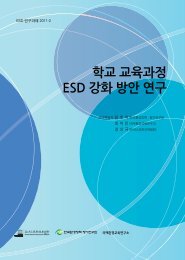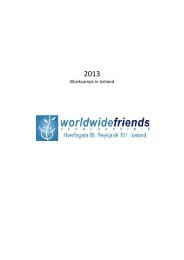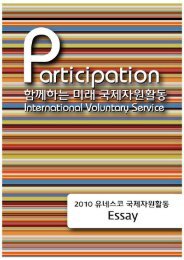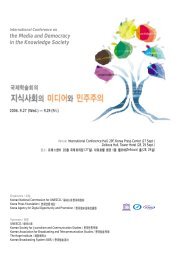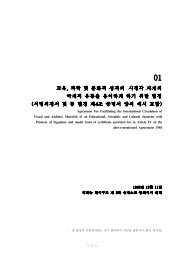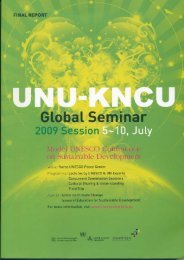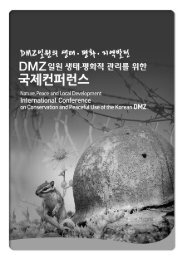íëìë³´ë2012문íì ë°ì ë¼ì´ëí ì´ë¸.pdf - ì ë¤ì¤ì½íêµììí
íëìë³´ë2012문íì ë°ì ë¼ì´ëí ì´ë¸.pdf - ì ë¤ì¤ì½íêµììí
íëìë³´ë2012문íì ë°ì ë¼ì´ëí ì´ë¸.pdf - ì ë¤ì¤ì½íêµììí
You also want an ePaper? Increase the reach of your titles
YUMPU automatically turns print PDFs into web optimized ePapers that Google loves.
the impact that culture has.<br />
At the institutional level, there have been positive signs. There has been an increasingly<br />
explicit recognition of culture for development: in 2005 the World Summit Outcome, adopted<br />
by the UN General Assembly, acknowledges the diversity of the world and recognizes that all<br />
cultures contribute to the enrichment of humankind. This was followed by the Outcome<br />
Document of the 2010 MDG Summit, published 10 years after the Millennium Declaration,<br />
emphasizing the importance of culture for development and its contribution to the<br />
achievement of the Millennium Development Goals. These messages were further reiterated<br />
in two consecutive Resolutions of the UNGA on “Culture and Development” in 2010 and<br />
2011, which called for the mainstreaming of culture into development policies and strategies,<br />
and underscored culture’s intrinsic contribution to sustainable development.<br />
In June 2012, the Report of the Secretary-General UN System Task Team on the Post-<br />
2015 UN Development Agenda, entitled “Realizing the Future We Want for All’ – a key<br />
document in the Post-2015 process - specifically noted that in its paragraph number 71 that:<br />
“It is also critical to promote equitable change that ensures people’s ability to choose<br />
their value systems in peace, thereby allowing for full participation and empowerment.<br />
Communities and individuals must be able to create and practice their own culture and<br />
enjoy that of others free from fear. This will require, inter alia, respect for cultural<br />
diversity, safeguarding cultural and natural heritage, fostering cultural institutions,<br />
strengthening cultural and creative industries, and promoting cultural tourism.”<br />
This is what has been accomplished. Looking ahead, the momentum is growing.<br />
The President of the UN General Assembly (PGA) will hold a thematic debate early 2013<br />
on the importance of culture for development, in particular with regard to the role it has to<br />
play in conflict prevention and peace building. Similarly, the 2013 ECOSOC Annual<br />
Ministerial Review’s theme will be on “Science, technology and innovation, and the potential<br />
of culture, for promoting sustainable development and achieving the Millennium<br />
Development Goals.”<br />
In view of the debates which will be held in the General Assembly from September<br />
2013, on taking stock of the MDGs and on the way forward, including a 3 rd UNGA<br />
Resolution on Culture and Development and perhaps a UN Conference on Culture and<br />
Development as a result of that, both the PGA and the ECOSOC discussions and<br />
awareness building in the field of culture and development will be of crucial importance.<br />
In fact, 2013 will be a critical year for developing the arguments and building the<br />
advocacy for culture in the post 2015 development framework. A UNESCO International



